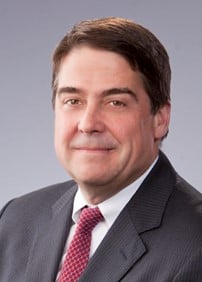Perspectives
7wireVentures Presents: Top of the Ladder Featuring Tom Richards, Cigna SVP and Global Lead for Strategy and Business Development

When you were a child, what did you want to be when you grew up?
I grew up in the era of the space program and when the program to land on the moon was really taking off. As a result, as a young boy, I thought it would be cool to be an astronaut. But  more than anything, I wanted to be in a field where I could have an impact on people, or I could change people’s lives. I wanted to do something that was exciting and new every day. For me at least, space and landing on the moon was something exciting and different.
more than anything, I wanted to be in a field where I could have an impact on people, or I could change people’s lives. I wanted to do something that was exciting and new every day. For me at least, space and landing on the moon was something exciting and different.
At that time, we thought that the space program was going to change the world, and, in some respects, I think it did. But for me it was probably more of the excitement and the variety and diversity of being an astronaut that really attracted me — not so much the walking around in a funny suit or flying weightless.
What was your first job?
To continue with the theme of wanting diversity in my work, I had a lot of jobs as a kid. I carried papers, I cut lawns, and I was a lifeguard — all of the classic jobs that young kids have.
Through those jobs, I like to think I developed some early work ethic. Mowing lawns in the neighborhood, I was in many ways a small businessman. From the way I acquired customers to how I priced my services, at a young age I was learning to build a business. In order to gain new business, I would price the lawn service lower and do a better job than the guys riding around in big trucks with corporate logos on their sides.
I do think one of the skills l learned young was how to sell. I grew my paper route business quite substantially by knocking on doors and asking neighbors if they wanted to switch papers or add a second paper. I carried the afternoon paper which was less popular compared to the morning paper. I learned early how to sell and provide people what they wanted. Those door-to-door skills were very helpful in my professional career.
What does your morning routine look like?
 I’ve recently become addicted to Peloton! I guess it’s the competitive streak in me that pulls me in — from beating my personal record to making my way up on the leader board.
I’ve recently become addicted to Peloton! I guess it’s the competitive streak in me that pulls me in — from beating my personal record to making my way up on the leader board.
Now, I start my day with a Peloton ride three or four times a week. Then I read a couple of newsletters, primarily Axios if I’m in a hurry to get the headline snippets. Then, I’m on the clock, beginning my workday at Cigna.
We recognize you have spent over three decades at Cigna and therefore had a front row seat to the transformation of the health insurance industry. What are the major changes you have witnessed across your career that has improved the health consumer’s experience? What are the core challenges that still need to be addressed?
I’ve definitely seen a lot of change. If I were to play back the story, while there have been several product changes, unfortunately, I don’t think that we as an industry have solved the basic problems that we were trying to solve — yet.
When I came into the health insurance industry, HMOs were just starting to grow. When I joined Cigna, I was selling the very first PPO product. We thought that this product was going to give people more choice, more affordability, and ultimately consumers would simply like a PPO more. We soon learned that was not the case for everyone. Then as an industry, we evolved to focus on a more consumer-driven experience and started being forward thinking about digital health and innovation. But at the end of the day, we still have work to do to meet and exceed consumer expectations. Healthcare is still too expensive, it is still too unpredictable, and it’s still way too complicated.
With this in mind, I’m really optimistic that we can make healthcare more affordable, predictable and simple in large part by becoming much more digital and much more flexible and consumer-oriented. But we have work to do.
I can point to several different bright spots. We at Cigna and 7wireVentures have partnered together on several digital health investments and commercial partnerships which are some notable examples. But, I’m not yet ready to declare victory.
I think that’s why I get off the Peloton every morning and come into work, because I still feel like we have such important work left to do. Our work – to increase access to affordable health care – is so crucial to people and ultimately to our economy. We’re not going to be able to grow within the U.S. or within the world if we can’t solve the health care challenge that we have in front of us.
With this in mind, I’m really optimistic that we can make healthcare more affordable, predictable and simple in large part by becoming much more digital and much more flexible and consumer-oriented. But we have work to do.
You were a critical champion for creating Cigna’s Venture Capital arm in 2018. What inspired you and the organization to launch a VC arm?
When we created Cigna Ventures, this was very much part of a broader innovation strategy that Cigna was focusing on across several of our business areas. At Cigna, we believed that some innovation will come from within the company, and some would come externally through partnerships and acquisitions. However, there was so much innovation going on in the early and late-stage marketplace that we believed no one entity was going to be able to create all the innovation that would be required to drive organizational-wide change. As a result, partnering with entrepreneurs and investing in early-stage companies was a core tenant of our strategy toward implementing widespread innovation. This belief set and the strategy was one that Cigna had implemented consistently even before we formally launched Cigna Ventures in 2018. As a venture fund, we look to not only invest in companies but partner with entrepreneurs to help grow these early-stage businesses, and in turn, help Cigna grow.
What do you look for in investments today?
We look for entrepreneurs that are working to solve a really important problem. While that might seem trivial, if you come up with a great solution that doesn’t matter to a large number of people, that’s much less interesting than if you’re working on something that’s really important to a big population. We’re also looking for high caliber talent who are working on the right problems. Finally, depending on the maturity of the company, we may also be looking at other elements like traction, product, or a company’s technology stack.
We tend to focus our efforts in three broad strategic areas all that are enabling the broader digitization and consumerization of healthcare. First, we look at solutions that are helping providers to be more efficient and effective in their care, or solutions that are actually delivering care. We at Cigna have a thesis that more care is going to be delivered outside of brick and mortar and therefore, virtual and digital solutions will be critical. Second, we look for digital health companies to improve functions of insuring and delivering care or improving the customer’s experience. Finally, we also look for some pure play companies that are a data or analytics platforms themselves some of which leverage more mature machine learning solutions.
We are thrilled that Cigna is not only a 7wireVentures Strategic Limited Partner and close thought partner for our team, but also a tremendous client and investor for our portfolio company RecoveryOne and commercial partner of NOCD! How does Cigna work with digital health companies to fuel ecosystem-wide innovation?
Right now, there is so much capital in the marketplace. It’s relatively easy for entrepreneurs to get funding. At Cigna Ventures, we’re not aiming to compete on deal terms. Instead, we are focusing on adding value. We tend to do so by being pretty active investors, either by taking a board observer or member seat. We also seek to have a commercial relationship with companies where we have made direct investments. 7wireVentures portfolio company Recoveryone is a great example of that type of strategic relationship. Finally, we try to be as quick as possible on decision making. While every entrepreneur wants a quick yes, the second-best answer is a quick no.
Likewise, internally we have a team within Cigna Ventures dedicated to helping companies navigate Cigna. We’re a Fortune 30 company, and a large, complex entity with several businesses within the organization. This team’s job is to guide entrepreneurs on who they should talk to, understanding decision making, and ultimately, how to speed up processes within Cigna such as the data security review or a technology evaluation.
What guidance would you provide to digital health founders to accelerate cross-collaboration with health plans and Cigna?
This will vary based on the space that the entrepreneur is in, but my broad advice would be to ask a lot of questions and listen. Entrepreneurs should understand what is important to the health plan or to the business line owner. It is mission critical to first form deep partnerships that then generate revenue and ultimately add value on both sides of the table. I firmly believe that having a solid understanding of what’s important to the partner will provide a foundation to building a strong, long-lasting, value-added partnership.
What’s your superpower?
 I’m really good listener. As a result of listening, I’m a good collaborator. Whether it’s with my team internally or listening and understanding signals with business partners and entrepreneurs, I believe this has enabled me to be successful in creating partnerships. While I’m of course not perfect, I try to at least listen first, and then respond second.
I’m really good listener. As a result of listening, I’m a good collaborator. Whether it’s with my team internally or listening and understanding signals with business partners and entrepreneurs, I believe this has enabled me to be successful in creating partnerships. While I’m of course not perfect, I try to at least listen first, and then respond second.
What would you do if you weren’t in healthcare?
 I would love to teach at a business school and lead a course on entrepreneurship and business.
I would love to teach at a business school and lead a course on entrepreneurship and business.
I probably would have to return to my alma mater, Chicago Booth or maybe my other alma mater, Dartmouth College. Ideally, I would do spring and fall at Booth and summers and winters at Tuck.
What is one piece of advice you have for our readers?
Remain persistent and resilient. In order to succeed in this world, whether you’re in a big corporation, running an early-stage business, or trying to change healthcare, tenacity is key. The stuff that really matters is hard. You have to remain really persistent at it. You have to remain flexible.
Maybe I was born an optimist, but I believe that people who can do that really can change at least a little corner of the world and for those of us in this industry, ultimately change healthcare.
“Remain persistent and resilient. In order to succeed in this world, whether you’re in a big corporation, running an early-stage business, or trying to change healthcare. The stuff that really matters is hard. You have to remain really persistent at it. You have to remain flexible.”